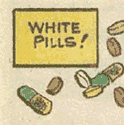| GOM! [message #114689] |
Tue, 14 September 2004 14:22  |
 |
 xptek
xptek
Messages: 1410
Registered: August 2004
Location: USSA
Karma:
|
General (1 Star) |
|
|
http://www.nzherald.co.nz/storydisplay.cfm?storyID=3590939&thesection=news&thesubsection=world
| Quote: |
Search Advanced Search / Help
World News
>> Home >> World News
A South Korean woman in Seoul reads a local newspaper which reports an explosion occurred. Picture / Reuters
US says North Korea blast unlikely to have been nuclear
13.09.2004
A huge explosion rocked North Korea last week but US and South Korean officials said it was unlikely to have been a nuclear weapons test despite the appearance of a "peculiar cloud" over the area.
South Korea first got indications of the blast from a satellite, but it was too early to say whether it was a bomb, a senior South Korean official said. The blast probably occurred between Wednesday evening and Thursday morning.
"The weather overall at the time was cloudy but there was a peculiar cloud, a cloud that was different from any other," said the official, who asked not to be identified. "We cannot confirm whether it had the characteristics of a mushroom cloud."
South Korea's Yonhap news agency said the blast in Kimhyungjik county in Ryanggang province in the northeast near the border with China appeared much stronger than a train explosion that killed at least 170 people in April. It quoted one source as saying a big mushroom cloud had been seen.
The North has said nothing yet about a blast but often notes events long after they happen - and sometimes not at all.
The New York Times reported in its Sunday editions the Bush administration had received recent intelligence reports that some experts believed could indicate North Korea was preparing to conduct its first nuclear weapons test explosion.
In Washington, US officials said there was no definitive explanation yet, although the blast did not appear to be nuclear.
A test would radically alter the stakes in the North's standoff with Washington over Pyongyang's atomic ambitions.
"We've got no indication that anything of the sort has happened. We believe these reports to be completely unfounded," said a State Department official who asked not to be named.
Yonhap said a mushroom cloud up to 4km in diametre was seen after the blast in an area near missile bases.
North Korea is believed to be developing nuclear weapons - the United States has said in the past it may well have one or two or even more already - but experts say any test would have been easily detected.
John Bellini, a geophysicist at the US Geological Survey in Golden, Colorado said his organisation had not detected an explosion large enough to be considered nuclear.
"If it was a nuclear bomb, that would have been detected by everybody in the world," he said. A blast involving a conventional bomb would have been too small to detect, he said.
South Korean Unification Minister Chung Dong-young also played down an atomic link. He chaired a meeting on Sunday of the National Security Council, which advises President Roh Moo-hyun.
There was no immediate reaction from North Korea's big neighbour and main ally, China.
A senior Chinese Communist Party delegation is in Pyongyang and met leader Kim Jong-il on Sunday, the North's official KCNA news agency said. It said the Chinese handed Kim a letter from Chinese President Hu Jintao and that Beijing had promised aid for the impoverished country.
An official at a hospital in the Chinese city of Ji'an, on the Yalu River across from North Korea, said they had not heard of any explosion or received any injured from across the border.
Aid agencies in Pyongyang said they had not heard of a blast.
Thursday was the 56th anniversary of North Korea's founding. The reclusive communist state often stages extravaganzas and big events to mark important anniversaries.
The news broke as South Korea, Japan, China, Russia and the United States were seeking to persuade North Korea to return to the negotiating table to discuss its nuclear weapons ambitions. The North, which threatened at earlier talks to test an atomic bomb, has said it doubts more negotiations will help.
China was the last country to set off an above-ground nuclear test, in 1980. It carried out its last nuclear test in 1996 and has since observed a self-imposed moratorium on testing.
Yonhap carried conflicting reports about the cause of the blast, quoting one source as saying it could have been a forest fire and another as saying it may have been an explosion at a weapons depot or factory.
Other possibilities include a failed missile engine test, a high-explosives test as a precursor to a nuclear blast or an industrial accident, diplomats said.
"In the northern part of the country, there are a lot of weapons factories and underground missile bases. The rocket-fuel could have exploded in the underground base, or something," said Daniel Pinkston, a North Korea expert at the Centre for Nonproliferation Studies in Monterey, California.
- REUTERS
|
cause = time
|
|
|
|





